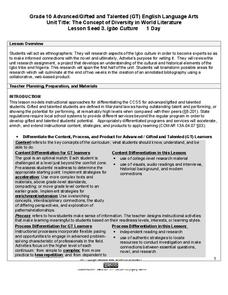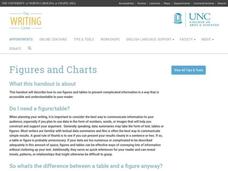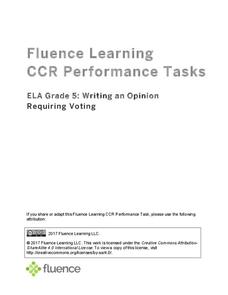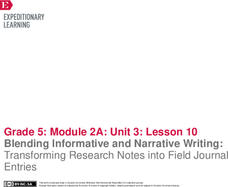Curated OER
History Personified
In 1856 Congressman Preston Brooks of South Carolina beat Senator Charles Sumner of Massachusetts over the head with a cane. This event, which highlighted the acrimonious debate over the expansion of slavery, is the focus of a paper...
Curated OER
How Do You Know?
What is the difference between primary and secondary sources? Help your middle schoolers develop a knowledge of appropriate sources to use when doing accurate research. They develop unique ways to incorporate literature in historical...
Overcoming Obstacles
Using Appropriate Resources
A lesson dives deep into reference materials. The class begins with a discussion of which resources are best used for specific purposes and how to identify ways to get the needed information. Learners share information about the internet...
Maryland Department of Education
The Concept of Diversity in World Literature Lesson 3: Igbo Culture
What cultural concepts must readers understand in order to connect to Things Fall Apart? As part of their study of Chinua Achebe’s novel, class members research Nigeria and the Igbo culture to create a collaborative, web-based, annotated...
University of North Carolina
Figures and Charts
Sometimes words aren't the best way to get information across to the reader. The eighth handout in the 24-part Writing the Paper series describes different type of figures and charts to display complex information in a paper....
Civil War Trust
Genealogy
The Civil War is undoubtedly a part of America's history, but could it be part of your pupils' history as well? Middle schoolers conduct research to discover a connection between their ancestors and the American Civil War. Whether they...
EngageNY
Local Sustainable Food Chain: Determining Cascading Consequences Using The Omnivore’s Dilemma
What are the consequences of the local, sustainable food chain? Research teams explore the question as they review Michael Pollan's The Omnivore's Dilemma. The teams complete Cascading Consequences charts and then choose research topics...
EngageNY
Grade 9 ELA Module 3, Unit 2, Lesson 4
It seems like the first result in a search engine is the best source, but how can you be sure? An activity on assessing sources guides ninth graders through an integral part of their inquiry-based research project, based on questions...
Fluence Learning
Writing an Opinion Requiring Voting
Challenge writers to compose an essay detailing their stance on, and the history of, voting. Three assignments, each broken down into three parts, requires fifth graders to take notes, read and complete charts, write paragraphs, compare...
Reed Novel Studies
The Mostly True Adventures of Homer P. Figg: Novel Study
What was the purpose of the Enrollment Act of 1863? Pupils consider the topic while completing the novel study for The Mostly True Adventures of Homer P. Figg by Rodman Philbrick. They write original similes and answer reading...
Reed Novel Studies
Treasure Island: Novel Study
Pirates ahoy! Readers go on an adventure using a novel study for Treasure Island as they research and write about a modern-day pirate story. Additionally, scholars practice writing similes and alliteration before answering comprehension...
EngageNY
Mid-Unit Assessment and Independent Reading Check-In
Your turn! Seventh graders work independently to complete the mid-unit assessment. They first read Images in Men in Advertising then answer questions referring to the text. When they finish the assessment, pupils read on their own.
Committee for Children
Students Learn to Stop Rumors Before They Start
Two activities look at how rumors are spread and ways class members can stop them. The first activity brings forth an in-depth conversation about how reporters gather information to write articles and how students can implement the same...
Curated OER
Olympic Shadow Boxes
What a cool way to incorporate art and use reference materials. Learners use classroom reference materials such as almanacs, encyclopedias, and dictionaries to answer one of four questions, and then they use the information to create a...
Curated OER
Researching Another Country's Holiday: Focusing and Gathering Information
Fifth graders brainstorm a list of holidays celebrated by a majority of people in the United States. They each select an American holiday from the list as well as another country that may have a holiday that is similar. Next, they...
EngageNY
Blending Informative and Narrative Writing: Transforming Research Notes into Field Journal Entries
The fabulous four. Scholars learn the four key components for creating an excellent journal entry. They then work to create a journal entry rubric and participate in a mini lesson about organizing and outlining journal entries.
EngageNY
Practice Planning a Historical Narrative: The Wheelwright
Fourth graders use a four-square graphic organizer to plan a paragraph writing about a wheelwright. Using gathered research from the previous unit, young writers discover how to organize a plot in preparation for writing a historical...
Read Works
Plymouth Colony
Read about the tumultuous beginning to the United States with an informational text passage about Colonial America. As young researchers peruse an article about the arrival of the Mayflower, the settlers' relationship to the neighboring...
ProCon
Electoral College
The Electoral College's role in elections is sometimes confusing and controversial. Pupils use a debate topics website to research the pros and cons of the practice to debate whether the United States should still use the Electoral...
Curated OER
In God We Trust; All Others Pay Cash
Learners review their knowledge on the First Amendment. After reading an article, they identify specific church and state issues. Using the Internet, they research President Bush's proposal from a specific point of view. They summarize...
Curated OER
Beginning Research
Students view and discuss a video segment to discover the importance of researching a topic before writing about it. They use the topic of plants to research information by looking through picture books and observing potted plants in...
Scholastic
What’s the Good Word? Etymology Project Guidelines
Who named the shapes, or the days of the week? Should words be removed from the dictionary if they're no longer commonly used? Are there too many words in the English language? Language arts students explore these and additional...
Curated OER
Easy Access: Creating Annotated Versions of News Articles
How can news coverage be made more accessible for teens? Model for your class how to use technology to annotate news stories containing unfamiliar references that hinder their interest in and understanding of a news story. Use the...
Curated OER
Writing an Explanation
Bananas are an important part of a healthy diet - but where do they come from? Third graders write an explanatory text about the origins of bananas. The bottom part of the paper includes necessary information about bananas, as well as a...
Other popular searches
- Reference and Research
- Fact Reference and Research
- Fcat Reference and Research
- Reference Research
- Reference Research Skills
- Reference and Research Skills
- Reference & Research
























